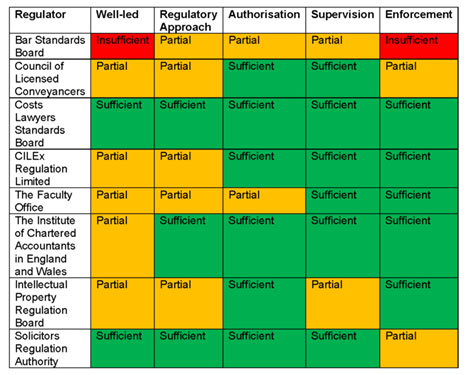
LSB identifies need for improved transparency in CRL decision making

CILEx Regulation Ltd (CRL) needs to improve the transparency of its decision-making, the Legal Services Board (LSB) has said in its annual performance assessment of the frontline regulators.
The LSB found CRL had “provided assurance in many areas regarding its operational performance” and “appears to have clear and effective authorisation, supervision and enforcement processes in place”.
The oversight body took less assurance in relation to the transparency of CRL’s decision-making and “justification of its regulatory approach”.
CRL was not the only regulator needing to up its performance in this area – the assessment found a lack of transparency to be a common theme, saying that “although some regulators had appropriate policies, they do not appear to be implementing them effectively, as it is difficult from published material to understand the decisions made by regulators and reasons for these decisions”.
The eight legal regulators are assessed against the same five standards: regulatory approach, authorisation, supervision, enforcement, and ‘well-led’ (governance).
Under a new system, they are rated as providing either ‘sufficient’, ‘partial’ or ‘insufficient’ assurance that they are meeting the LSB’s requirements on each, using traffic light ratings.

The level of assurance each regulatory body provided the LSB for each standard
CRL was found to have met LSB standards for supervision, enforcement, and authorisation, partially meeting those for regulatory approach and ‘well-led’ (governance).
While the LSB was happy with much of CRL’s regulatory approach in practice, “we have concerns about CRL’s ability to articulate its current approach to regulation, how its chosen arrangements are effective, and how these help consumers and promote the regulatory objectives. We also have concerns about its ability to consistently deploy evidence to support its proposals”.
A recent example was CRL’s application to hold enforcement hearings remotely. “CRL held a wide and useful evidence base on the conduct of its recent hearings, but we only obtained the necessary evidence to make the case for change upon probing and more directly questioning CRL’s approach, rather than CRL’s initial application (which constituted its public articulation of why it was proposing the change).”
CRL had also not been able to meet its own target of establishing a long-term solution to its compensation scheme arrangements.
On governance, the issue was that few of CRL’s board papers on substantive policy or operational issues were published and most of the discussions on them were minuted confidentially. This made it “very difficult from the material that is published to understand what factors CRL is taking into account in making decisions”, the LSB said.
Otherwise on governance, “we have seen a lot of evidence about the processes CRL has in place and activities it undertakes”.
The LSB praised CRL’s “new flexible approach to resourcing”, which has enabled it to “deploy resource where most effective, in particular handling enforcement cases more efficiently”.
The Costs Lawyers Standard Board was the only regulator to meet all requirements, with the Bar Standards Board coming under pressure to improve performance after receiving two ‘insufficient’ ratings in relation to ‘well-led’ and enforcement.
Chris Nichols, director of policy and regulation at the LSB, said: “Overall, we have seen welcome improvement in some areas from most [regulators], and there are some examples of good practice for everyone to learn from and build on. However, there continue to be areas where further improvement is needed.
“We expect regulators to operate transparently and ensure they have a sufficiently robust evidence base for their work. This is central to being a well-led organisation and ensures others, including the public, can understand how decisions are made and hold the regulator to account. For a number of regulators there is more work to do in this regard.
“Over the coming year, we will roll out our new framework for assessing regulators’ performance. We will follow up on the themes and issues identified in this assessment and expect all the regulators to continue working on improving their performance, benefiting the profession and ensuring legal services better meet the needs of society.”
Jonathan Rees, chair of the CRL board, said: “At its meeting in February the CRL board considered carefully the LSB’s assessment of CRL’s performance, and agreed new transparency requirements so more of its board papers and discussions are published. Over the next few months, it will also consider a range of further enhancements to be implemented by the beginning of September.”
